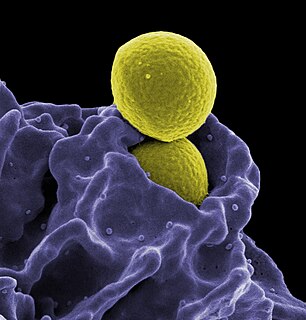
Immunology is a branch of medicine and biology that covers the medical study of immune systems in humans, animals, plants and sapient species. In such we can see there is a difference of human immunology and comparative immunology in veterinary medicine and animal biosciences.
In medicine, the hygiene hypothesis states that early childhood exposure to particular microorganisms protects against allergic diseases by contributing to the development of the immune system. In particular, a lack of exposure is thought to lead to defects in the establishment of immune tolerance. The time period for exposure begins in utero and ends at school age.
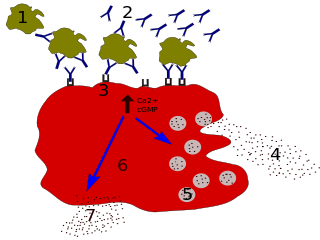
Immunoglobulin E (IgE) is a type of antibody that has been found only in mammals. IgE is synthesised by plasma cells. Monomers of IgE consist of two heavy chains and two light chains, with the ε chain containing four Ig-like constant domains (Cε1–Cε4). IgE is thought to be an important part of the immune response against infection by certain parasitic worms, including Schistosoma mansoni, Trichinella spiralis, and Fasciola hepatica. IgE is also utilized during immune defense against certain protozoan parasites such as Plasmodium falciparum. IgE may have evolved as a defense to protect against venoms.
The National Institute of Allergy and Infectious Diseases is one of the 27 institutes and centers that make up the National Institutes of Health (NIH), an agency of the United States Department of Health and Human Services (HHS). NIAID's mission is to conduct basic and applied research to better understand, treat, and prevent infectious, immunologic, and allergic diseases.
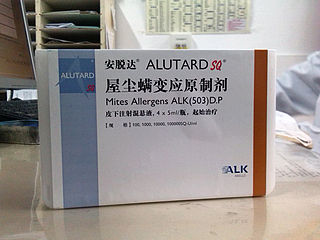
Allergen immunotherapy, also known as desensitization or hypo-sensitization, is a medical treatment for environmental allergies, such as insect bites, and asthma. Immunotherapy involves exposing people to larger and larger amounts of allergen in an attempt to change the immune system's response.

Applied kinesiology (AK) is a pseudoscience-based technique in alternative medicine claimed to be able to diagnose illness or choose treatment by testing muscles for strength and weakness.
Nambudripad's Allergy Elimination Techniques (NAET) is a form of alternative medicine which proponents claim can treat allergies and related disorders. The techniques were devised by Devi Nambudripad, a California-based chiropractor and acupuncturist, in 1983, drawing on a combination of ideas from applied kinesiology, acupuncture, acupressure, nutritional management, and chiropractic methods.
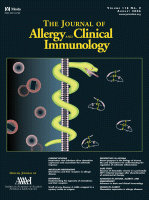
The Journal of Allergy and Clinical Immunology is a monthly peer-reviewed medical journal covering research on allergy and immunology. It is one of two official journals of the American Academy of Allergy, Asthma, and Immunology. The journal was established in 1929 as the Journal of Allergy and obtained its current name in 1971. The name change was purportedly related to a change in the attitude among physicians about the breadth of applicability of the term "allergy". The journal has been published under the Mosby imprint since its inception.
Founded in 1943, the American Academy of Allergy, Asthma & Immunology (AAAAI) is a professional medical membership organization of nearly 6,800 allergist/immunologists and related professionals around the world with advanced training and experience in allergy, asthma and other immunologic diseases. The Academy is dedicated to the advancement of the knowledge and practice of allergy, asthma and immunology for optimal patient care.
The International Union of Immunological Societies (IUIS), a member of the International Council for Science, is an organization which serves as an umbrella organization for many national and regionally grouped immunological societies. The organization was founded in 1969. The ten founding member societies were the American Association of Immunologists, British Society for Immunology, Canadian Society for Immunology, Dutch Society for Immunology, Gesellschaft fur Immunologie, Israel Immunological Society, Polish Society of Immunology, Scandinavian Society for Immunology, Societe Francaise d’immunologie, and Yugoslav Immunological Society. IUIS had 83 member societies in 2019.
The European Academy of Allergy and Clinical Immunology (EAACI) is a non-profit organisation for European clinicians, researchers and allied health professionals in the field of allergy and clinical immunology, covering asthma, rhinitis, eczema and occupational allergy, food and drug allergy, severe anaphylactic reactions, autoimmune disorders, and immunodeficiencies.
Barton Ford Haynes is an American physician and immunologist internationally recognized for work in T-cell immunology, retrovirology and HIV vaccine development. Haynes is a Frederic M. Hanes Professor of Medicine and Immunology at Duke University Medical Center. He is the director of the Duke Human Vaccine Institute and the Duke Center for HIV/AIDS Vaccine Immunology and Immunogen Discovery (CHAVI-ID), which was funded by the National Institute of Allergy and Infectious Diseases (NIAID) in 2012. In addition, Haynes directs the B-cell Lineage Envelope Design Study, the Centralized Envelope Phase I Study, and the Role of IgA in HIV-1 Protection Study as part of the Collaboration for AIDS Vaccine Discovery (CAVD), which was funded by the Bill and Melinda Gates Foundation in 2006.

Ruby Pawankar has been President of the World Allergy Organization (WAO), 2012 and 2013. She is the first Indian and first woman President of WAO, which was established in 1951. Currently she is Past President, WAO, President of the Asia Pacific Association of Allergy Asthma and Clinical Immunology (APAAACI) and Council Member of Collegium Internationale Allergolicum (CIA). She is Professor of Allergy, Department of Pediatrics at Nippon Medical School in Tokyo, Japan and Guest Professor at Showa University School of Medicine, Tokyo, Japan, Kyung Hee University School of Medicine, Seoul, Korea and St. John's Medical College, Bengaluru, India. She is a recipient of Pravasi Bharatiya Samman 2010 for excellence in medicine, from the President of India.
The British Society for Immunology, or BSI, is a UK-based organisation of British immunologists but accepts members from all countries. It was founded in November 1956 by John H. Humphrey, Robin Coombs, Bob White, and Avrion Mitchison and is one of the oldest and largest Immunology societies in the world and the largest in Europe. It publishes two scientific journals: Immunology and Clinical and Experimental Immunology.
C. Garrison Fathman is a Professor of Medicine and Division Chief of Immunology and Rheumatology at Stanford University School of Medicine. He is also the Associate Director of the Institute for Immunity, Transplantation and Infection ITI at Stanford and Director of the Center for Clinical Immunology at Stanford (CCIS). He was Founder and first-President of the Federation of Clinical Immunology Societies (FOCIS). His substantial scientific contributions in the areas of cellular and molecular immunology have brought him international recognition. As Director of the CCIS, Dr. Fathman initiated a multidisciplinary approach to study and treat autoimmune diseases, including rheumatoid arthritis, multiple sclerosis, and insulin-dependent diabetes mellitus, and initiated several new approaches to education and community outreach. He was instrumental in helping develop the Human Immune Monitoring Center at Stanford University.
Igor Petrovych Kaidashev is a Ukrainian immunologist and allergist, MD, and Professor. Igor Kaidashev is President of the Ukrainian Society of Immunology, Allergy and Immunorehabilitation, Professor of the Department of Internal Medicine No. 3 with Phthisiology, and Vice-Rector for Research & Development at Ukrainian Medical Stomatological Academy (UMSA) since 2010.
Suranjith Seneviratne is a doctor from Sri Lanka who practices in allergy and immunology.

Andrii Ihorovych Kurchenko is a Ukrainian dermatologist, immunologist and allergologist, Doctor of Sciences in Medicine, Professor, head of department of Clinical Immunology and Allergology at O.Bohomolets National Medical University. He is an Expert of the Scientific and Expert Council at the State Expert Center of the Ministry of Health of Ukraine, a Fellow of the European and American Academies of Allergology and Clinical Immunology and Vice-President of the Ukrainian Society of experts in Immunology, Allergology and Immune rehabilitation (UTIAI). He is Deputy-editor of the journal "Immunology and Allergology. Science and Practice", as well as a co-author of the national textbooks "Clinical and Laboratory Immunology" (2012) and "Immunology" (2013).
Cezmi Akdis is a medical researcher in the field of immunology. He is director of the Swiss Institute of Allergy and Asthma Research (SIAF) in Davos, Switzerland and the editor in chief of the journal Allergy.
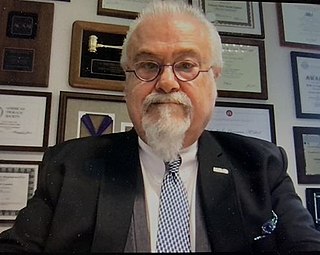
Giorgio Walter Canonica is an Italian allergist, pulmonologist and professor of Respiratory Medicine at Humanitas University, Milan, Italy and Director Personalized Medicine Asthma & Allergy Center at Humanitas Research Hospital IRCCS-Milano Italy since December 2016. He is known for his research work related to innovative treatment strategies for allergic diseases which includes biological response modifier in form of targeted immunotherapy with primary emphasis on sublingual immunotherapy (SLIT). He has served as Secretary General and President elect of World Allergy Organisation for six consecutive years and has served as president of the same organization during 2007–09. He is also the vice-president of INTERASMA.







